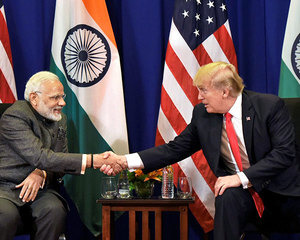By Su Hao (Global Times, 24 January 2018) – I recently attended the third Raisina Dialogue, hosted in New Delhi by India’s Ministry of External Affairs and the Observer Research Foundation. India has been trying to forge the conference into an Indian version of the Shangri-La Dialogue. This year, the topic that sparked the most heated discussion was the framework and content of the Indo-Pacific strategy.
US officials, as well as scholars connected with government, have been trying to promote the concept of the Indo-Pacific strategy, arguing that this is a structure to maintain the balance of power. Directly or indirectly, they emphasized that the strategy is aimed at counterbalancing the rise of China and promised the US will cooperate with India militarily, to persuade New Delhi to join the strategic framework.
Japanese officials were more straightforward. They claimed that like-minded nations such as the US, Japan, Australia and India need to jointly safeguard the freedom of navigation on the basis of international law, and to establish the Indo-Pacific strategic framework to contain China on the platform of the Malabar naval exercises.
It is worth noting that Harry Harris, commander of the US Pacific Command, called China a “disruptor” in the Indo-Pacific region. Admiral Katsutoshi Kawano, Chief of Staff of the Japan Joint Staff, echoed him, saying that Beijing is changing the status quo in the Pacific and the Indian Ocean, and it is important for countries in the area to cooperate against it.
I refuted the misleading remarks during the forum, pointing out the huge flaws in the design of the Indo-Pacific strategy. There are two historical trends in the region. The first is establishing the so-called balance of power, which was what Europe tried to realize for lasting peace during the 19th century. The essence of such a balance is competition, containment and confrontation, which in the end led to two world wars. The other is Asia’s historical logic – an inner connection between the West Pacific and the Indian Ocean. When Chinese civilization spread toward the South and West, and when Indian civilization, Buddhist and Islamic culture expanded toward the East, they were realized through peaceful communications.
Therefore, I asked, do you really wish to lead Asian nations toward confrontation through the historical logic of the West rather than seeing them promote the establishment of regional order through their own tradition? Don’t you want to see coordination and collaboration between countries of the Indian and Pacific oceans and those in Asia?
The Indo-Pacific region has been a huge historic platform for interactions, communications and integration among Asian nations since ancient times. Over five decades ago, the Five Principles of Peaceful Coexistence, a co-initiative by China, India and Myanmar, have now become the commonly accepted principles in the international community.
Less than five years ago, Chinese President Xi Jinping proposed the initiative of building the 21st Century Maritime Silk Roadin Indonesia and this has been welcomed by countries along the route. Such an initiative can proactively promote the mutual beneficial new type of major power relations and the establishment of a new order of regional cooperation.
Therefore, I’d like to propose a new expression, the “Pacific-Indian Trans-Region” to stress the inseparable ties among countries in the region in terms of politics, economy and security, which is determined by the area’s historical logic.
Interestingly, Ram Madhav, the Indian ruling Bharatiya Janata Party’s general secretary, avoided using the term “Indo-Pacific” during his speech. Instead he chose the term “Indian Ocean region,” which showed India’s cautious attitude toward the Indo-Pacific strategy.
I also felt another kind of atmosphere during the meeting. When communicating with an Indian high-level official in charge of a rural development project, I introduced China’s plan to build beautiful rural areas. She responded excitedly that the plan was inspirational and expressed her wish to cooperate with China in this regard.
A professor from Australia also believed that the Indo-Pacific strategy does not conform to the historical trend and can hardly be sustained. Granted, if a strategic design or the establishment of an order does not accord with historical logic and future trends, it must be a historic mistake with no vitality at all.
The author is director of the Asia-Pacific Research Center at the China Foreign Affairs University. [email protected]


